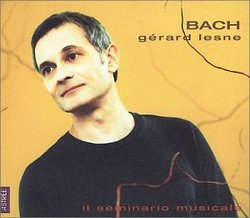| All Artists: Johann Christoph Bach, Johann Michael Bach, Johann Sebastian Bach, Georg Melchior Hoffmann, Gérard Lesne, Il Seminario musicale, Patrick Cohen-Akenine, Anne-Marie Lasla, Sylvie Moquet Bruno Cocset Title: G�rard Lesne - Bach Members Wishing: 0 Total Copies: 0 Label: Astree Naive Release Date: 7/9/2002 Genres: Pop, Classical Styles: Vocal Pop, Opera & Classical Vocal, Forms & Genres, Concertos, Historical Periods, Baroque (c.1600-1750) Number of Discs: 1 SwapaCD Credits: 1 UPC: 822186088739 |
Search - Johann Christoph Bach, Johann Michael Bach, Johann Sebastian Bach :: G�rard Lesne - Bach
 | Johann Christoph Bach, Johann Michael Bach, Johann Sebastian Bach G�rard Lesne - Bach Genres: Pop, Classical
|
Larger Image |
CD Details |
CD ReviewsAlarm! Dismay! Uncertainty! Giordano Bruno | Wherever I am, I am. | 01/29/2009 (5 out of 5 stars) "Gerard Lesne has more 'credibility' with me than anyone this side of Barack Obama, and Lesne's credibility has been tested by twenty years' worth of superlative performances. He is, quite simply, the most expressive and 'musical' male alto alive. His ensemble Il Seminario Musicale has produced an amazing succession of great recordings of French and Italian Baroque music, matched by very few in terms of consistency.
When I first heard this CD a few years ago, however, I confess that my first reaction was to be utterly slack-jawed. "What's this?" I thought, "why, there must be some mistake! This sounds more like Charpentier than Bach! So this is what happens when a bunch of Frenchies try to perform our beloved echt Deutsch Lutheran Johan Sebastian!" If you've heard Lesne sing, perhaps you can imagine the languid suppleness with which he sings the cantata 'Widerstehe doch der Sünde". The orchestra of dark strings - two violins, two violas, bass violin, violone, and three bass gambas - draw their bows across their low-tuned strings with equal flexibility of timbre. It's not like any Bach you've ever heard by German, Dutch, or English musicians. What Lesne has done is simply to perform BACH in the same historically enlightened style he would use in performing any other composer, from Buxtehude to Scarlatti, of the same era. And why shouldn't BACH be performed the same way? Is it possible that "we" have excluded BACH from the canon of Baroque taste, and gone on performing BACH in a peculiar tradition established by Mendelssohn and maintained ever since? The BACH of Albert Schweitzer? The austere, pious, provincial, intellectual BACH? You wouldn't know it from the cover of this CD, but BACH includes Johann Michael Bach (1648-1694), Johann Christoph Bach (1642-1703) and Johann Sebastian Bach (1685-1750), plus the well-known BACH cantata BWV 53 - "Schlage doch, gewünschte Stunde" - which was actually composed by Georg Melchior Hoffman (1685-1715). Talk about putting Johann Sebastian back in context! I strongly suspect that many Bach devotees will detest this performance on first hearing, and rush to rinse their ears with Helmut Rilling. Friends, that would be a mistake. Even if you eventually conclude that you prefer a more stately Teutonic version of Bach, you won't be able to ignore or discount the 'statement' that Gerard Lesne makes with this recording. "There are more things in heaven and Bach, Horatio, than are dreamt of in your musicology."" |

 Track Listings (12) - Disc #1
Track Listings (12) - Disc #1